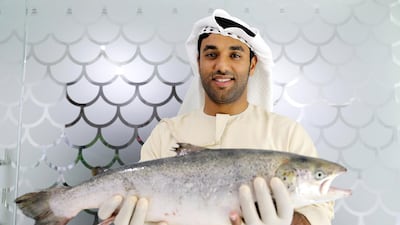When in a reflective mood, a friend of mine is fond of repeating the aphorism: “Journalists publish their mistakes, doctors kill them, and lawyers hang them.”
These days, one could not only add that “Politicians lie about them”, but go on to say that they, as a breed, rarely admit their mistakes at all.
However, as a journalist I am in a position to concede that the views I expressed in a column written five years ago, might, just possibly, be worth re-examining.
I am prompted to do so by the recent news story that the Jebel Ali-based company Fish Farm would be commencing sales early this month of fresh, locally raised Atlantic salmon.
Back in March 2014, not long after another company, Asmak, had attracted extensive publicity for their announcement of plans to raise salmon in Abu Dhabi's western Al Dhafra region, I wrote a column questioning the feasibility of its plans. Headlined "Is salmon farming in the UAE just an implausible dream?", it suggested that perhaps various environmental constraints would render the project impractical.
The plan was initially announced in late 2013, and the company had predicted that supplies of fresh local salmon would be reaching the shops by the next summer. I concluded my piece by saying: “I look forward to hearing how successfully Asmak have dealt with the remarkable challenge they have set themselves.”
Five years on, Asmak’s focus is on the import of salmon from Norway, and little more has been heard of its intention to farm the fish locally. Perhaps the raising of my “sceptical eyebrow” in 2014 was justified.
The idea of producing salmon for the market here in the UAE, though, was clearly one worth investigating. The CEO of Fish Farm, Bader Bin Mubarak, and his colleagues have invested much time, effort and money in getting to the stage where they have been able to announce that the first fish are coming to market.
I suspect that since they began investigating how to bring their first eggs and fingerlings – as juvenile fish are known – here to establish their breeding stock, they will have gone through a whole litany of challenges and encountered a number of setbacks.
Now, 18 months since the first fingerlings arrived, the company is ready to announce its success, at least in the first stage of its journey. I, for my part, am happy to say that my initial scepticism about the whole idea of raising salmon in the UAE has proven unfounded. With the right team, the right research and the right investment, the obstacles have been overcome.
I wonder, though, if there aren’t some lessons that could be learned from this particular story.
Perhaps one is that, if an idea for an innovative business project comes to mind, it’s probably worth trying to get it properly under way and to identify and resolve some of the inevitable hiccups before trumpeting it to the media. If it eventually goes belly-up – and lots do – you will face a little less embarrassment if there are no wildly optimistic projections of future success already in print.
A corollary, of course, is that the media itself – or sections of it - might benefit from being a little less credulous when the latest breathless press release arrives about a new project. Kick the wheels a bit; take less on trust.
Although my friends in the marketing and PR industry might not like me saying this, it might be useful to adopt a rule of thumb that the more over-excited the language is in a press release, the more important it is to delve into the underlying factual data. Questioning by the media might even help to identify and resolve potential problems.
In a media environment where fake news is increasingly pervasive, a return to an emphasis on the proper checking of facts and claims would clearly be beneficial, not just in reporting on politics but in business too.
This would mean that there is more of a critical approach to proposals that, at a first glance, seem impractical. Some off-the-wall and imaginative ideas will work brilliantly. Others won’t.
When the UAE Mars Mission was first announced in October 2014, for example, I had a few doubts as to whether it would come to fruition. It is now clear that the quiet, steady work has not only achieved a lot, it has also impressed the project’s foreign partners. Whether there will be an Emirati town on Mars by 2117 is a little bit beyond my powers of imagination, but so far, so good.
Meanwhile, I eagerly await further news of two other much-promoted ideas: the plan to tow icebergs from the Antarctica to Fujairah and, from the same stable, the concept of an undersea railway from the UAE to India. I’ve commented on the first before but have, thus far, resisted the temptation to do so on the second. I’m always happy to have my scepticism disproved, or even to admit a mistake.
Peter Hellyer is a consultant specialising in the UAE’s history and culture


